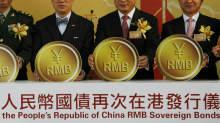
While investors flee the euro zone and America's municipal bond market, there is a debt market out there that is thriving, where investors are starved of paper and begging for more. It is the nascent offshore yuan bond market in Hong Kong.
In a little-noticed offering at the end of last week, Caterpillar raised one billion yuan in Hong Kong, a deal that secured seven times as much in subscriptions as there were bonds on offer. The American earth-moving equipment company was following McDonald's, which became the first foreign yuan issuer in August.
The restaurant chain raised a more trifling 200 million yuan in its daring move, but the yields are very keen, with Caterpillar's offering priced with a 2 per cent coupon. On Monday, China's finance ministry blessed the new offshore debt market with a clutch of big issues, raising eight billion yuan in bonds with a range of maturities from 2 to 10 years.
Beijing is getting cheap money; a one billion yuan issue of 10-year bonds is priced at a yield of just 2.48 per cent compared with the equivalent onshore mainland China 10-year bond that yields 3.94 per cent. Launched in 2007 and opened up to foreign issuers in February this year, the offshore Yuan market and so-called "dim sum bonds" are attracting a widening pool of capital.
Yuan deposits in Hong Kong more than doubled in volume to 149 billion yuan in just six months and the interest in the currency is driving down costs for yuan issuers in Hong Kong at the same time as interest rates are rising in domestic Chinese markets, where Beijing is trying to curb inflation. Excitement over the prospects is pushing Standard Chartered, the U.K. investment bank which handled the McDonald's issue, to hire 1,800 people, mainly to service the offshore yuan market.
For Hong Kong, the yuan remains a foreign currency market-the local currency is still the Hong Kong dollar, but the offshore financial centre is being used as a laboratory to internationalize the Chinese currency. This week's spate of bond issues by the Chinese treasury was clearly designed to create sovereign bench marks against which private issuers will be able price debt.
For Caterpillar, a long-standing Chinese manufacturer, the deal enables it to fund its mainland equipment leasing business, and there can be no doubt that other European industrial companies will quickly tap this market to fund their Chinese businesses. Rusal, the Russian aluminium smelter which recently floated its stock in China, is said to be contemplating a yuan debt issue.
Slowly, China is edging towards the liberation of its currency on international markets. The offshore bond market is part of that, although Yuan trade in Hong Kong is still very limited. Still, the Chinese currency has been climbing gently since the dollar peg ended in June, gaining 2.4 per cent against the U.
S. currency and foreign exchange traders reckon it will continue to rise. Allowing the yuan to float to its natural level would help to control Chinese domestic inflation, making imports of energy and commodities cheaper and boosting the value of the yuan in a worker's pocket. In the meantime, we should expect more European and North American bankers to migrate to the East.





